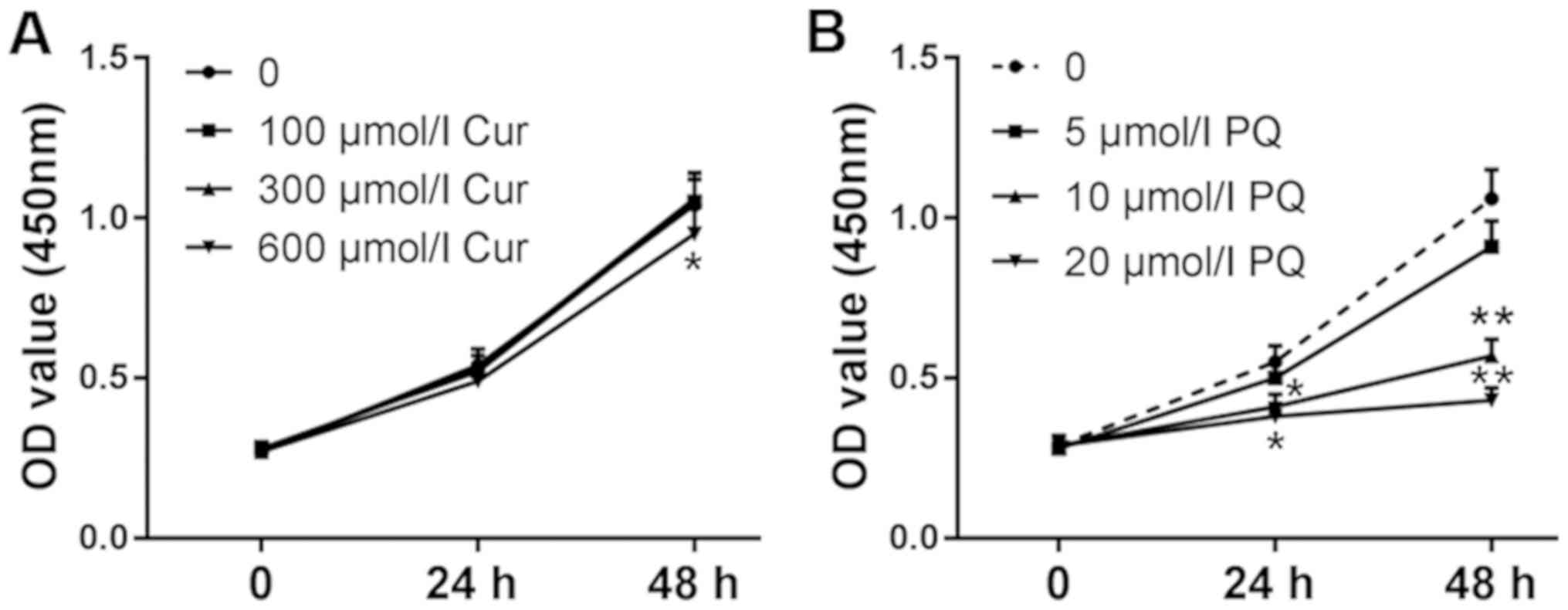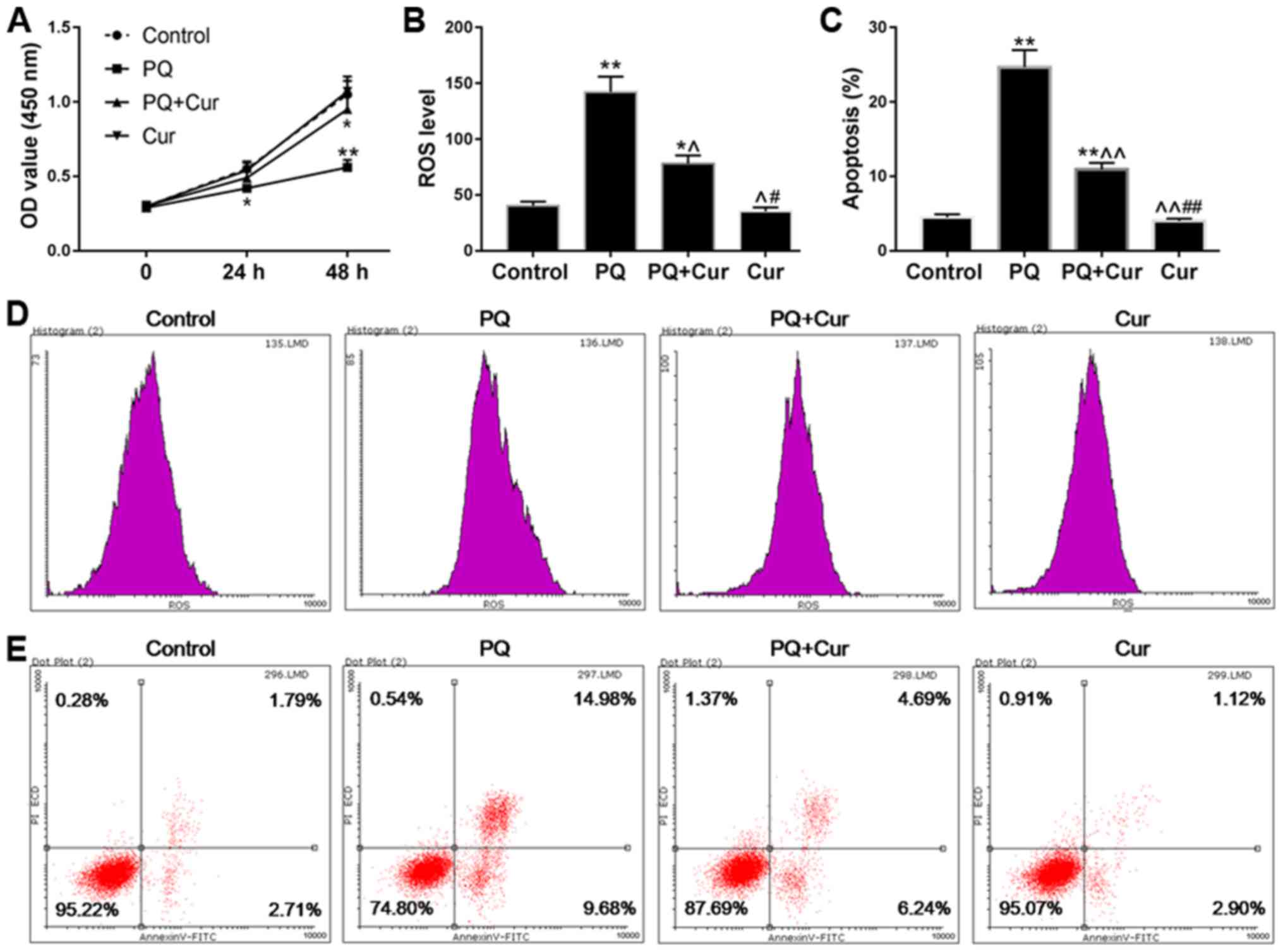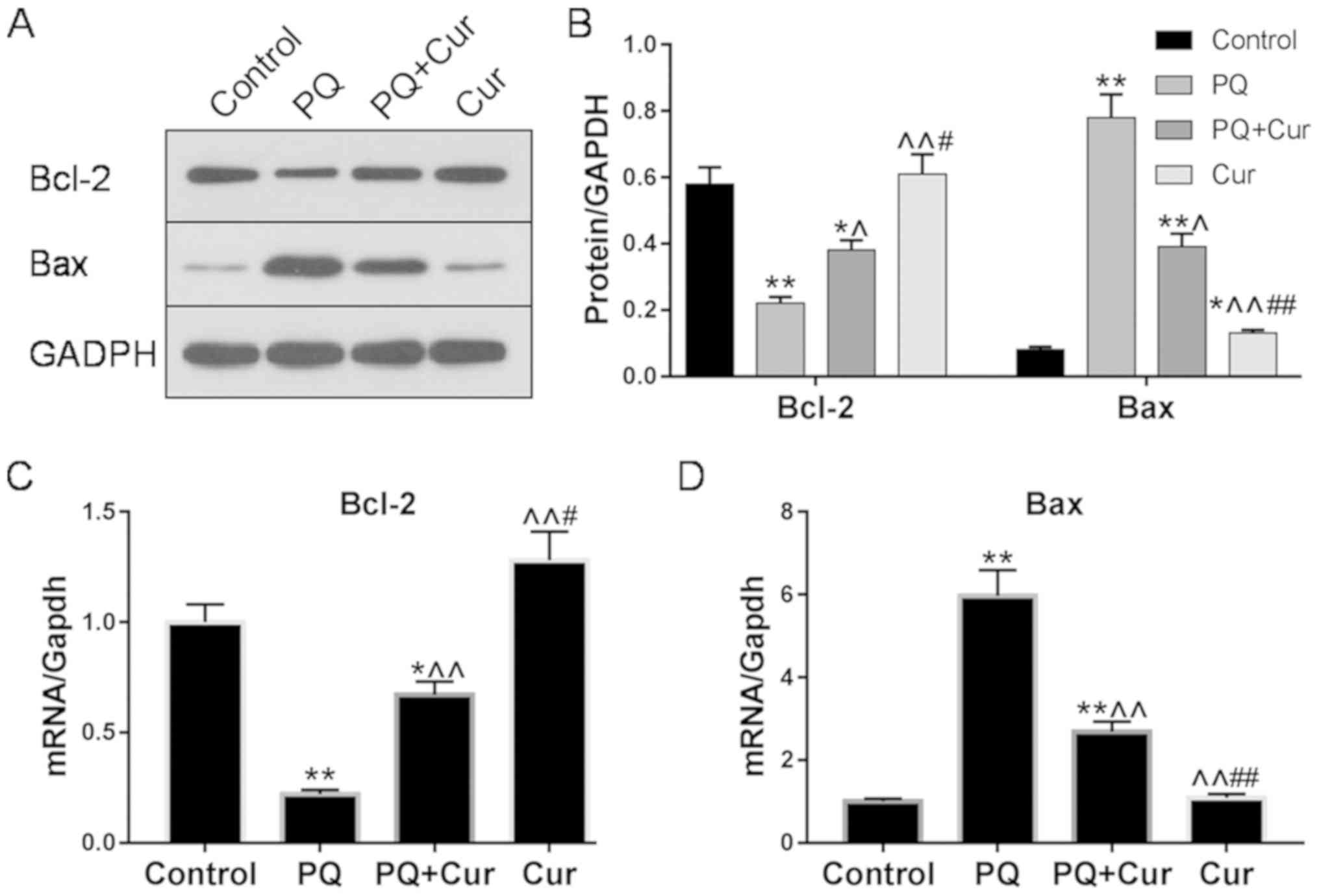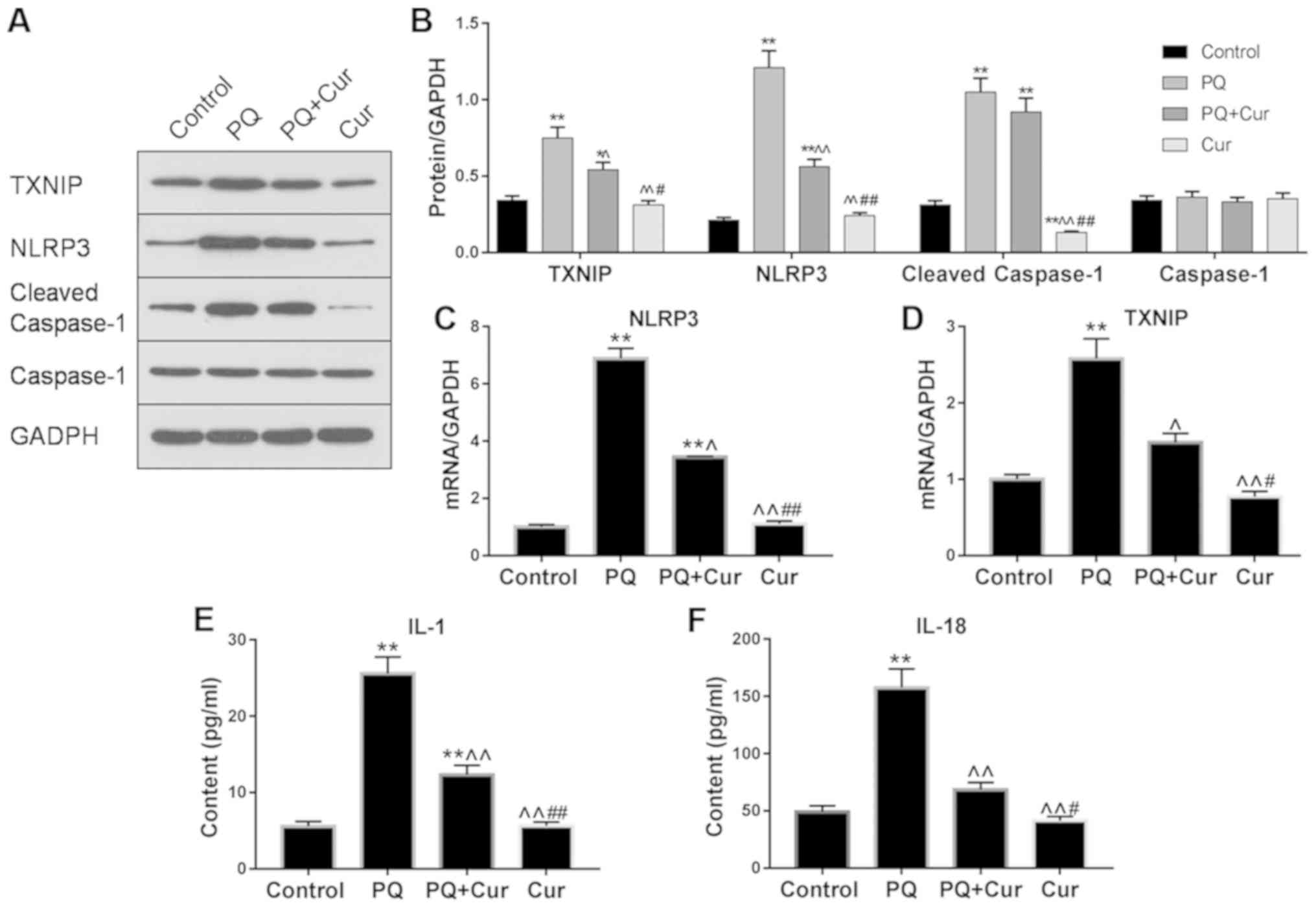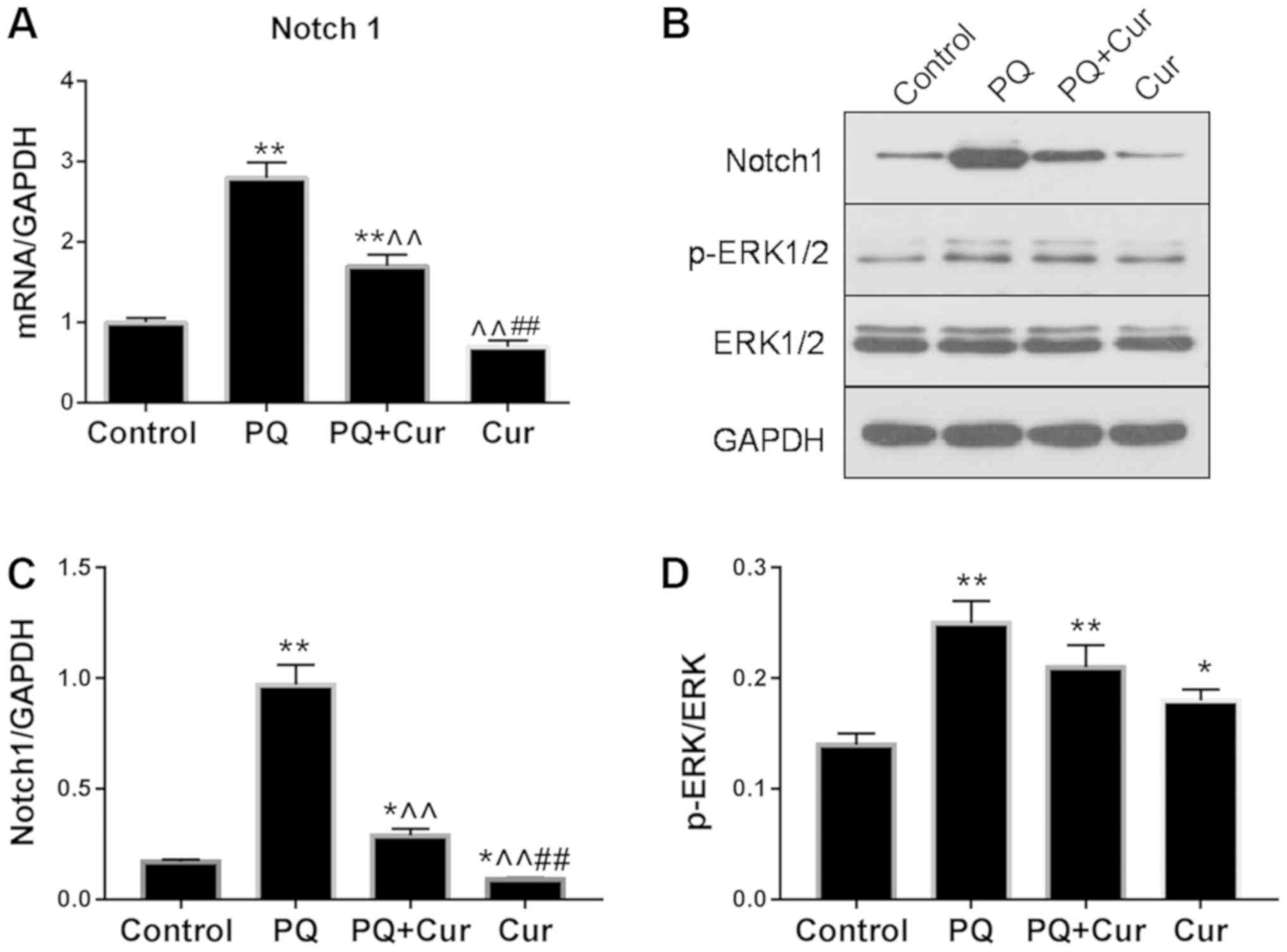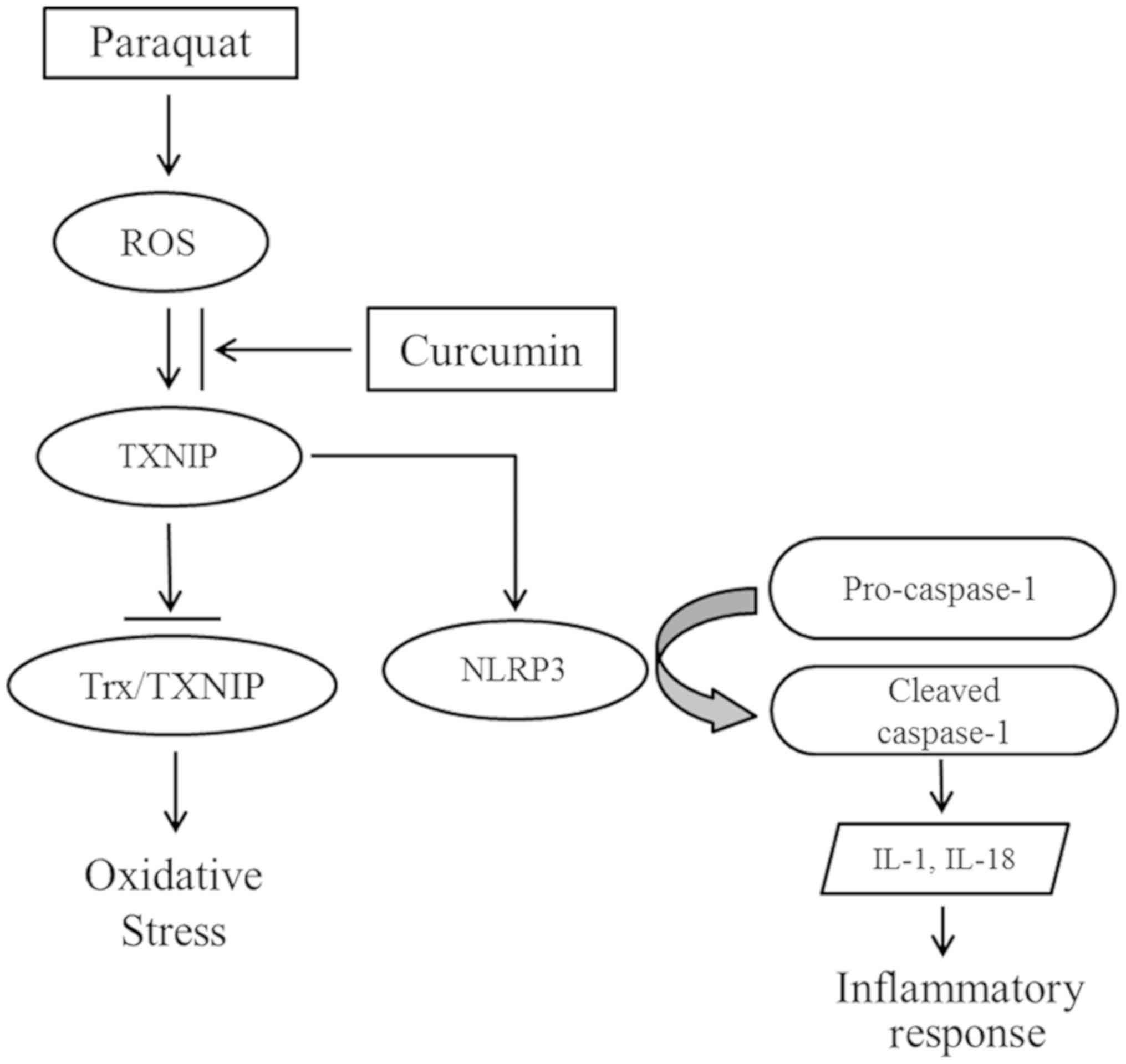|
1
|
Baltazar T, Dinis-Oliveira RJ, Duarte JA,
de Lourdes Bastos M and Carvalho F: Paraquat research: Do recent
advances in limiting its toxicity make its use safer? Br J
Pharmacol. 168:44–45. 2013. View Article : Google Scholar : PubMed/NCBI
|
|
2
|
Zhang B, Lang Y and Yi O: Literature
analysis of paraquat poisoning in China (1991–2008). Chin J Crit
Care Med. 30:139–141. 2010.(In Chinese).
|
|
3
|
Kim E, Leverage WT, Liu Y, Panzella L,
Alfieri ML, Napolitano A, Bentley WE and Payne GF: Paraquat-melanin
redox-cycling: Evidence from electrochemical reverse engineering.
ACS Chem Neurosci. 7:1057–1067. 2016. View Article : Google Scholar : PubMed/NCBI
|
|
4
|
Dinis-Oliveira RJ, Duarte JA,
Sanchez-Navarro A, Remião F, Bastos ML and Carvalho F: Paraquat
poisonings: Mechanisms of lung toxicity, clinical features, and
treatment. Crit Rev Toxicol. 38:13–71. 2008. View Article : Google Scholar : PubMed/NCBI
|
|
5
|
Tomita M, Okuyama T, Katsuyama H, Miura Y,
Nishimura Y, Hidaka K, Otsuki T and Ishikawa T: Mouse model of
paraquat-poisoned lungs and its gene expression profile.
Toxicology. 231:200–209. 2007. View Article : Google Scholar : PubMed/NCBI
|
|
6
|
Liu J, Xiong Y and Jiang M: Ratio of
injured lung volume fraction in prognosis evaluation of acute PQ
poisoning. Biomed Res Int. 2018:e45015362018.
|
|
7
|
Yang W, Liu W, Yu W, Fei D, Meng X, Yang
S, Meng S and Zhao M: Angptl2 deficiency attenuates paraquat
(PQ)-induced lung injury in mice by altering inflammation,
oxidative stress and fibrosis through NF-κB. Biochem Biophys Res
Commun. 503:94–101. 2018. View Article : Google Scholar : PubMed/NCBI
|
|
8
|
Hu S, Qiao C, Yuan Z, Li M, Ye J, Ma H,
Wang J, Xin S and Zhang J: Therapy with high-dose long-term
antioxidant free radicals for severe paraquat poisoning: A pilot
study. Exp Ther Med. 16:5149–5155. 2018.PubMed/NCBI
|
|
9
|
Buendia JA, Chavarriaga GJR and Zuluaga
AF: Burden of paraquat poisoning in the department of Antioquia,
Colombia. BMC Pharmacol Toxicol. 20:112019. View Article : Google Scholar : PubMed/NCBI
|
|
10
|
Nasr Isfahani S, Farajzadegan Z,
Sabzghabaee AM, Rahimi A, Samasamshariat S and Eizadi-Mood N: Does
hemoperfusion in combination with other treatments reduce the
mortality of patients with paraquat poisoning more than
hemoperfusion alone: A systematic review with meta-analysis. J Res
Med Sci. 24:22019. View Article : Google Scholar : PubMed/NCBI
|
|
11
|
Devi TS, Lee I, Hüttemann M, Kumar A,
Nantwi KD and Singh LP: TXNIP links innate host defense mechanisms
to oxidative stress and inflammation in retinal Muller glia under
chronic hyperglycemia: Implications for diabetic retinopathy. Exp
Diabetes Res. 2012:4382382012. View Article : Google Scholar : PubMed/NCBI
|
|
12
|
Yoshihara E, Masaki S, Matsuo Y, Chen Z,
Tian H and Yodoi J: Thioredoxin/Txnip: Redoxisome, as a redox
switch for the pathogenesis of diseases. Front Immunol. 4:5142014.
View Article : Google Scholar : PubMed/NCBI
|
|
13
|
Zhou R, Tardivel A, Thorens B, Choi I and
Tschopp J: Thioredoxin-interacting protein links oxidative stress
to inflammasome activation. Nat Immunol. 11:136–140. 2010.
View Article : Google Scholar : PubMed/NCBI
|
|
14
|
Lamkanfi M and Dixit VM: Inflammasomes and
their roles in health and disease. Annu Rev Cell Dev Biol.
28:137–161. 2012. View Article : Google Scholar : PubMed/NCBI
|
|
15
|
Schroder K and Tschopp J: The
inflammasomes. Cell. 140:821–832. 2010. View Article : Google Scholar : PubMed/NCBI
|
|
16
|
Liu Z, Zhao H, Liu W, Li T, Wang Y and
Zhao M: NLRP3 inflammasome activation is essential for
paraquat-induced acute lung injury. Inflammation. 38:433–444. 2015.
View Article : Google Scholar : PubMed/NCBI
|
|
17
|
Narayanan A, Kehn-Hall K, Senina S,
Lundberg L, Van Duyne R, Guendel I, Das R, Baer A, Bethel L, Turell
M, et al: Curcumin inhibits rift valley fever virus replication in
human cells. J Biol Chem. 287:33198–33214. 2012. View Article : Google Scholar : PubMed/NCBI
|
|
18
|
Rahmani AH, Al Zohairy MA, Aly SM and Khan
MA: Curcumin: A potential candidate in prevention of cancer via
modulation of molecular pathways. Biomed Res Int. 2014:7616082014.
View Article : Google Scholar : PubMed/NCBI
|
|
19
|
Shehzad A, Lee J and Lee YS: Curcumin in
various cancers. Biofactors. 39:56–68. 2013. View Article : Google Scholar : PubMed/NCBI
|
|
20
|
Gong Z, Zhao S, Zhou J, Yan J, Wang L, Du
X, Li H, Chen Y, Cai W and Wu J: Curcumin alleviates DSS-induced
colitis via inhibiting NLRP3 inflammsome activation and IL-1β
production. Mol Immunol. 104:11–19. 2018. View Article : Google Scholar : PubMed/NCBI
|
|
21
|
Ding XQ, Wu WY, Jiao RQ, Gu TT, Xu Q, Pan
Y and Kong LD: Curcumin and allopurinol ameliorate fructose-induced
hepatic inflammation in rats via miR-200a-mediated TXNIP/NLRP3
inflammasome inhibition. Pharmacol Res. 137:64–75. 2018. View Article : Google Scholar : PubMed/NCBI
|
|
22
|
Han G, Wei Z, Cui H, Zhang W, Wei X, Lu Z
and Bai X: NUSAP1 gene silencing inhibits cell proliferation,
migration and invasion through inhibiting DNMT1 gene expression in
human colorectal cancer. Exp Cell Res. 367:216–221. 2018.
View Article : Google Scholar : PubMed/NCBI
|
|
23
|
Huang Y, An L, Hui KM, Ren Q and Wang W:
An LDLa domain-containing C-type lectin is involved in the innate
immunity of Eriocheir sinensis. Dev Comp Immunol. 42:333–344. 2014.
View Article : Google Scholar : PubMed/NCBI
|
|
24
|
Livak KJ and Schmittgen TD: Analysis of
relative gene expression data using real-time quantitative PCR and
the 2(-Delta Delta C(T)) method. Methods. 25:402–408. 2001.
View Article : Google Scholar : PubMed/NCBI
|
|
25
|
Goodman RB, Pugin J, Lee JS and Matthay
MA: Cytokine-mediated inflammation in acute lung injury. Cytokine
Growth Factor Rev. 14:523–535. 2003. View Article : Google Scholar : PubMed/NCBI
|
|
26
|
Wen SH, Wu HJ, Lin L, Chong L, Zhu LL,
Zhang WX, Zhang HL and Li CC: Adjunctive dexamethasone therapy
improves lung injury by inhibiting inflammation and reducing RIP3
expression during Staphylococcus aureus pneumonia in mice. Int
Immunopharmacol. 23:709–718. 2014. View Article : Google Scholar : PubMed/NCBI
|
|
27
|
Chen Y, Nie YC, Luo YL, Lin F, Zheng YF,
Cheng GH, Wu H, Zhang KJ, Su WW, Shen JG and Li PB: Protective
effects of naringin against paraquat-induced acute lung injury and
pulmonary fibrosis in mice. Food Chem Toxicol. 58:133–140. 2013.
View Article : Google Scholar : PubMed/NCBI
|
|
28
|
Tyagi N, Kumari A, Dash D and Singh R:
Protective effects of intranasal curcumin on paraquot induced acute
lung injury (ALI) in mice. Environ Toxicol Pharmacol. 38:913–921.
2014. View Article : Google Scholar : PubMed/NCBI
|
|
29
|
Li GP, Yang H, Zong SB, Liu Q, Li L, Xu
ZL, Zhou J, Wang ZZ and Xiao W: Diterpene ginkgolides meglumine
injection protects against paraquat-induced lung injury and
pulmonary fibrosis in rats. Biomed Pharmacother. 99:746–754. 2018.
View Article : Google Scholar : PubMed/NCBI
|
|
30
|
Cheresh P, Kim SJ, Tulasiram S and Kamp
DW: Oxidative stress and pulmonary fibrosis. Biochim Biophys Acta.
1832:1028–1040. 2013. View Article : Google Scholar : PubMed/NCBI
|
|
31
|
Das KC, Lewis-Molock Y and White CW:
Elevation of manganese superoxide dismutase gene expression by
thioredoxin. Am J Respir Cell Mol Biol. 17:713–726. 1997.
View Article : Google Scholar : PubMed/NCBI
|
|
32
|
Hwang J, Suh HW, Jeon YH, Hwang E, Nguyen
LT, Yeom J, Lee SG, Lee C, Kim KJ, Kang BS, et al: The structural
basis for the negative regulation of thioredoxin by
thioredoxin-interacting protein. Nat Commun. 5:29582014. View Article : Google Scholar : PubMed/NCBI
|
|
33
|
Yu X, Lan P, Hou X, Han Q, Lu N, Li T,
Jiao C, Zhang J, Zhang C and Tian Z: HBV inhibits LPS-induced NLRP3
inflammasome activation and IL-1β production via suppressing the
NF-κB pathway and ROS production. J Hepatol. 66:693–702. 2017.
View Article : Google Scholar : PubMed/NCBI
|
|
34
|
Dai J, Zhang X, Li L, Chen H and Chai Y:
Autophagy inhibition contributes to ROS-producing NLRP3-dependent
inflammasome activation and cytokine secretion in high
glucose-induced macrophages. Cell Physiol Biochem. 43:247–256.
2017. View Article : Google Scholar : PubMed/NCBI
|
|
35
|
Heneka MT, Carson MJ, El Khoury J,
Landreth GE, Brosseron F, Feinstein DL, Jacobs AH, Wyss-Coray T,
Vitorica J, Ransohoff RM, et al: Neuroinflammation in Alzheimer's
disease. Lancet Neurol. 14:388–405. 2015. View Article : Google Scholar : PubMed/NCBI
|
|
36
|
Masters SL, Dunne A, Subramanian SL, Hull
RL, Tannahill GM, Sharp FA, Becker C, Franchi L, Yoshihara E, Chen
Z, et al: Activation of the NLRP3 inflammasome by islet amyloid
polypeptide provides a mechanism for enhanced IL-1β in type 2
diabetes. Nat Immunol. 11:897–904. 2010. View Article : Google Scholar : PubMed/NCBI
|
|
37
|
Wang Z, Hu W, Lu C, Ma Z, Jiang S, Gu C,
Acuña-Castroviejo D and Yang Y: Targeting NLRP3 (Nucleotide-binding
domain, leucine-rich-containing family, pyrin domain-containing-3)
inflammasome in cardiovascular disorders. Arterioscler Thromb Vasc
Biol. 38:2765–2779. 2018. View Article : Google Scholar : PubMed/NCBI
|
|
38
|
Zhang M, Harashima N, Moritani T, Huang W
and Harada M: The roles of ROS and caspases in TRAIL-induced
apoptosis and necroptosis in human pancreatic cancer cells. PLoS
One. 10:e01273862015. View Article : Google Scholar : PubMed/NCBI
|
|
39
|
Friedemann T, Otto B, Klätschke K,
Schumacher U, Tao Y, Leung AK, Efferth T and Schroder S: Coptis
chinensis franch. exhibits neuroprotective properties against
oxidative stress in human neuroblastoma cells. J Ethnopharmacol.
155:607–615. 2014. View Article : Google Scholar : PubMed/NCBI
|
|
40
|
Piggott K, Deng J, Warrington K, Younge B,
Kubo JT, Desai M, Goronzy JJ and Weyand CM: Blocking the NOTCH
pathway inhibits vascular inflammation in large-vessel vasculitis.
Circulation. 123:309–318. 2011. View Article : Google Scholar : PubMed/NCBI
|
|
41
|
Poulsen LC, Edelmann RJ, Krüger S,
Diéguezhurtado R, Shah A, Stavnoraas TE, Renzi A, Szymanska M, Wang
J, Ehling M, et al: Inhibition of endothelial NOTCH1 signaling
attenuates inflammation by reducing cytokine-mediated histone
acetylation at inflammatory enhancers. Arterioscler Thromb Vasc
Biol. 38:854–869. 2018. View Article : Google Scholar : PubMed/NCBI
|
|
42
|
Singla RD, Wang J and Singla DK:
Regulation of Notch 1 signaling in THP-1 cells enhances M2
macrophage differentiation. Am J Physiol Heart Circ Physiol.
307:H1634–H1642. 2014. View Article : Google Scholar : PubMed/NCBI
|
|
43
|
Jiang L, Ke M, Yue S, Xiao W, Yan Y, Deng
X, Ying QL, Li J and Ke B: Blockade of Notch signaling promotes
acetaminophen-induced liver injury. Immunol Res. 65:739–749. 2017.
View Article : Google Scholar : PubMed/NCBI
|















